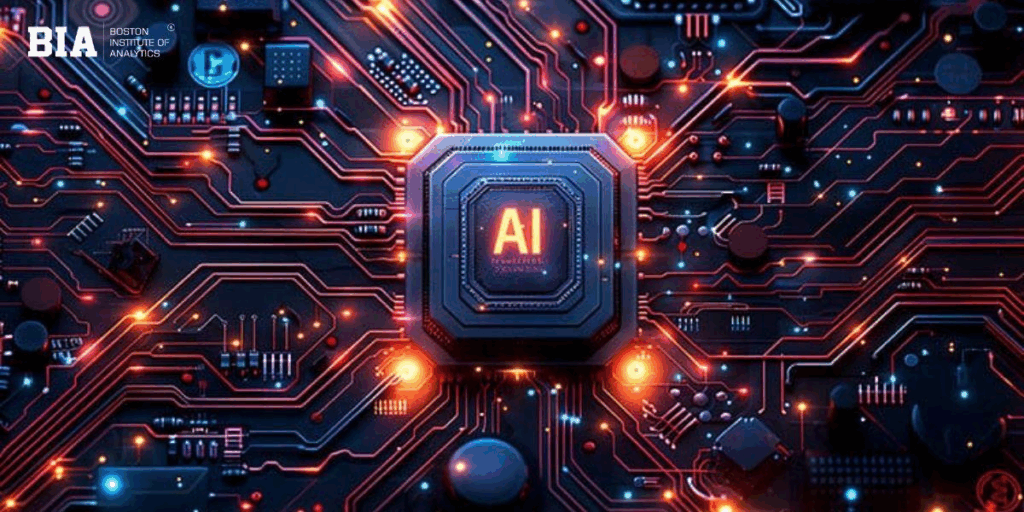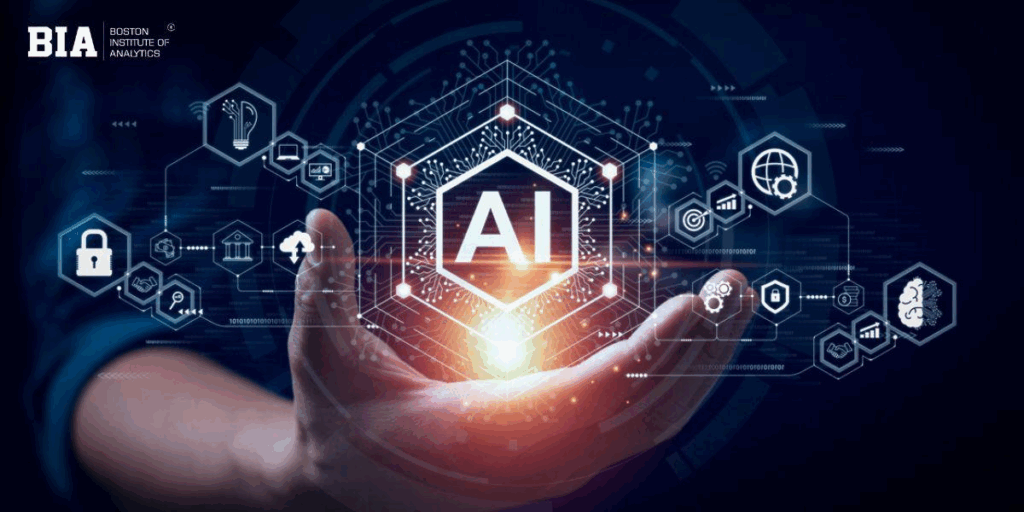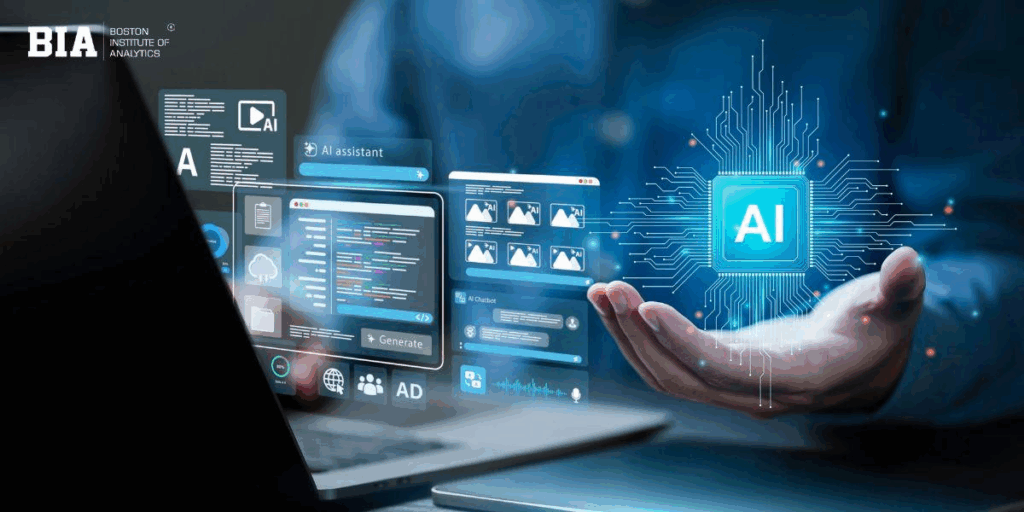In 2026, the college admissions process is unrecognizable from the past. Only a few short years ago, applications were reviewed manually, and decisions made based on using human eyes alone to review applications piled high on desks or in digital storage. No longer does the admissions process only use a human eyeball alongside a stack of applications.
Artificial Intelligence (AI) is now the driving force of the process and is used frequently if not always to assist higher education evaluators and recruiters to review, select, and engage prospective students. This is a revolution in practice, not evolution in practice, and is a shift in a way of thinking about efficiency, equity, and outreach in a competitive recruiting and enrolment environment. For anyone who is interested in understanding these shifts – or even to participate in or shape them – an Artificial Intelligence Course at the Boston Institute of Analytics is now extremely timely and relevant.

The Dawn of Algorithmic Review: Beyond the GPA
Historically, college admissions committees have relied on CRM (Cumulative Record Marks) GPAs, standardized tests, essays, and recommendation letters to evaluate applicants. While these features remain important, AI allows for new, sophisticated metrics of analysis.
1. Holistic Review, supercharged: AI algorithms can analyze tons of comprehensive applicant profiles quicker than any human evaluator. This not only includes GPAs and test scores, but also extracurricular, work experience, volunteer hours, tone, semantics, and content of the applicant’s submitted essays. Consider an AI feature that would analyze thousands of applications and not only consider GPAs but also analyze trends and patterns of behaviour. This could include patterns identifying resilience, leadership potential, creativity, or genuine interest in the subject field. This type of assessment goes beyond simple keyword analysis and inferences, as it utilizes contextual understanding.
2. Identifying Non-Traditional Talent: AI’s capability to identify outstanding students who may not fall under the label of “perfect applicant” is one of its key strengths. A student, for example, who grew up disadvantaged, faced exceptional hurdles, took incredible initiative, or completed a series of independent projects, could shine in AI’s evaluations even if their standardized test scores did not put them in the same tier as other applicants. AI’s algorithms can be trained to assess potential in many forms, allowing for a more balanced and equitable admissions process.
3. Bias Mitigation (and New Challenges): A key promise AI has in admissions is the possibility of reducing human bias. Given appropriately structured algorithms and diverse, unbiased datasets, AI could evaluate applicants based only on merit and not be subject to unconscious biases based on race, gender, socioeconomic status, or school prestige. Of course, the aforementioned is made much more complicated by the potential for AI systems to be highly biased based on the data they are trained on. AI trained on existing biases in prior admissions decisions can both perpetuate and amplify these biases. This illustrates the crucial need for ethical AI development and aggressive auditing. These issues have been thoroughly examined in an upper-level Artificial Intelligence Course.
Personalized Outreach and Engagement: Beyond Generic Emails
Once a pool of latent candidates is identified, AI steps in to transfigure how universities interconnect and engage with them.
1. Dynamic CRM and Predictive Analytics: Universities are increasingly using AI-powered Customer Relationship Management (CRM) systems. These systems track interactions with prospective students, analyze their interests (based on website visits, brochure downloads, email clicks, and even social media activity), and predict their likelihood of applying and enrolling. This allows admissions teams to tailor their outreach efforts, sending personalized emails, inviting students to relevant webinars, or connecting them with faculty in their areas of interest.
2. AI-Powered Chatbots and Virtual Assistants: More universities are adopting AI powered Customer Relationship Management (CRM) for tracking interactions with prospective students, assessing their interests based on their visits to the website, number of download of their number of clicks on brochures, number of download their number of clicks on emails, and even number of follow on social media. This determines their likelihood of applying and enrolling so admissions teams can develop targeted outreach strategies by sending personalized emails, web links for relevant webinars, or connecting students with faculty in their area of interest.
3. Personalized Content Generation: Picture a prospective student needs a question answered about a program at 2 AM. With AI, rather than wait until office hours, that prospective student has the ability to ask a chatbot a question and have an instant, accurate answer about an application deadline, a scholarship opportunity, campus life or a specific program’s requirements. Chatbots can handle a high-volume inquiry. This high-volume response gives admissions staff more time to invest in complex and personalized interactions with prospective students.

The Application Process: Streamlined and Smart
The submission and review development itself is undergoing a significant change thanks to AI.
1. Automated Document Processing: AI can quickly scan and classify application documents – transcripts, resumes, portfolios, essays, and recommendations. Admission officers have a large file preparation and reading workload to perform before the task of screening admission applications even begins; this reduces the amount of work admissions professionals need to do that would force them to spend time doing high-level strategic work. Machines can “read” and have some level of understanding of documents through Optical Character Recognition (OCR) and natural language processing (NLP).
2. Plagiarism Detection Reinvented: Plagiarism detection software has been around for a while and AI is not new to this; however, AI can enhance plagiarism detection and take it to another level. AI can, not only match text but identify subtle inconsistencies in style, and in the same way, identify paraphrasing in writing, while also identifying when multiple applicants used the same AI tool generated activity (which is becoming more common). AI provides assurance that we can have integrity during the admissions process.
3. Essay Analysis and Feedback (with a Human Touch): AI (and AI-enabled tools) can read essays for degree of planning, development of ideas, originality, and potential indicators of critical thinking and analysis. AI cannot replace human read of an essay, as the level of human subjectivity and nuance in the reading, AI can be employed as an initial filter that can highlight essays that met an apparent standard of recommendable to strong, or ambiguous essays to recommend for review. In some cases, apps even offered applicants some initial review of their essay and would further help them shape their writing before submission.
AI in Scholarship and Financial Aid Decisions
The impression of AI extends beyond preliminary admissions decisions to the decisive area of financial aid and scholarships.
1. Optimized Scholarship Matching: AI algorithms can compare a student’s profile with a large database of scholarships and isolate those for which they are most qualified. It makes it easier for students (who might otherwise miss the opportunity) and for universities (which desire to award aid to deserving recipients).
2. Predicting Financial Need: While sensitive, AI can provide universities an opportunity to assess a student’s degree of financial need with greater accuracy by comparing a variety of socioeconomic factors, which can help universities optimally and equitably share their limited financial resources.

The Future Workforce: Why an AI Course Matters
As the presence of AI grows in all aspects of higher education, the work force demand for specialists in Artificial Intelligence will explode. Admissions offices will be in need of data scientists, AI ethicists, and machine learning engineers to develop, service, and oversee these complex systems as part of their basic workflow. Also, anyone with a role in education will be better served with a better understanding of the possible capabilities and limitations of AI.
The Boston Institute of Analytics has complete programs, including an Artificial Intelligence Course, designed to prepare students to provide the knowledge and practical skills they will need to be successful in this new paradigm. Whether your objective is to design the next generation of admissions AI or to merely understand the impact of these tools on your own career, a foundational knowledge of AI is no longer a specialized skill, but a prerequisite.
FAQ – How AI Is Transforming the College Admissions Process in 2026
Q1: How is AI helping colleges review applications faster?
AI can rapidly process thousands of applications, examining grades, test scores, essays, and extra-curricular activities. This minimizes manual intervention and allows admissions teams to concentrate on the nuanced nature of their decisions.
Q2: Can AI provide guidance to students applying to colleges?
Indeed! AI platforms provide customized recommendations for a student, such as improving essays, determining student strengths, and identifying colleges or programs that would be good fits according to a student’s profile.
Q3: Does AI influence admission decisions?
AI is helpful because it can forecast a student’s success and engagement based on patterns from previous years. That being said, while AI can inform decisions, it is ultimately the choice of the human admissions officer.
Q4: Is AI biased in college admissions?
AI can help find aspects of individual bias in the admissions process, but again, it is dependent on the training data to determine fairness. Clearly, it is crucial to have human involvement to verify equitable outcomes.
Q5: How is AI improving communication with applicants?
AI chatbots can answer frequently asked questions, schedule interviews, and can even perform first-round interviews via video or text, streamlining communication.
Q6: Can AI help colleges improve diversity?
Yes. AI can analyze larger data sets to identify underrepresented talent pools, assisting colleges with developing a more equitable admissions approach.
Q7: Will AI replace admissions officers?
No. AI is a tool used to improve efficiency and provide information and insight. However, human judgment is always important in evaluating applicants holistically.
Final Thoughts
The use of artificial intelligence in collegiate admissions is not a hoped-for future phenomenon, but instead is a current phenomenon that is growing. It is now 2026, and AI is making the process better and faster and possibly more equitable. By enhancing holistic reviews and finding diverse talent; streamlining the application process; maximizing financial aid; AI is changing the whole experience, from prospect to enrolled student. But with these changes come the necessity for continued ethical reflection, effective data governance, and an overall commitment to human engagement. The human experience empathy, judgment, and connection – will always be at the centre of higher education. Rather than replace the human experience, AI enhances the work of admissions professionals and allows them to spend time doing the things that really matter, building relationships, and nurturing the next cohort of learners. For anyone looking to be a leader in the revolution, an Artificial Intelligence Course is a worthwhile opportunity for their future.
